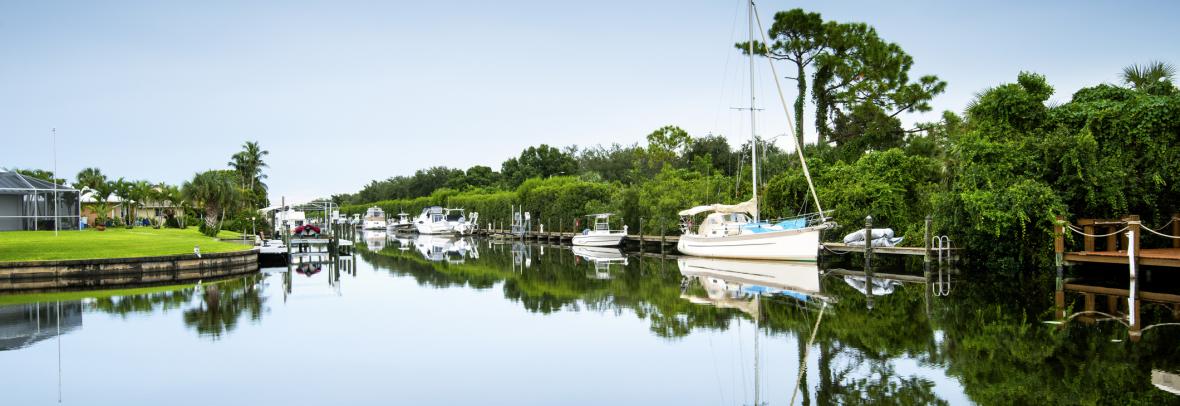
Gov. DeSantis says the money from HUD will go to large-scale infrastructure projects that can make Fla. communities more resilient to future disasters.
LAKELAND, Fla. – About $150 million has been awarded to communities through the Florida Department of Economic Opportunity’s (DEO) Rebuild Florida Mitigation General Infrastructure Program. The program, administered by DEO, allows local governments to develop large-scale infrastructure projects to make communities more resilient to future disasters. Gov. Ron DeSantis announced the money recently while speaking in Lakeland.
“This transformational mitigation funding will go a long way in helping Florida’s communities invest in their futures through critical infrastructure improvements,” DeSantis said.
The U.S. Department of Housing and Urban Development’s (HUD) Community Development Block Grant – Mitigation (CDBG-MIT) program provides the funds, which were allocated to Florida. The program originally formed in response to the 2016 to 2017 presidentially declared disasters.
“The Rebuild Florida Mitigation General Infrastructure Program provides storm-impacted communities the opportunity to complete large, high-impact infrastructure projects that will pay dividends for future generations,” said DEO Executive Director Dane Eagle.
Funding from the Rebuild Florida Mitigation General Infrastructure Program
- Broward County ($6,250,000) – to construct an interconnect between the Broward County Reuse Facility and the City of Pompano Beach’s OASIS Reuse facility.
- City of Arcadia ($4,823,579) – to widen a stormwater tributary to provide additional storage during storm events to better control flood volume.
- City of Avon Park ($670,623) – to improve the existing potable water system through replacement of asbestos pipes with PVC piping, adding additional bore to improve water pressure, and to install an upgraded chlorine system.
- City of Doral ($1,000,000) – to reduce the frequency and severity of stormwater flooding by providing a positive-gravity drainage outfall discharging into the NW 58th Street canal.
- City of Fort Lauderdale ($10,500,000) – to replace aging and undersized stormwater infrastructure with new systems that help neighborhood flooding issues and better water quality treatment before being released into the intracoastal waterway.
- City of Key West ($3,099,159) – to install tide valves at 40 stormwater outfall points of discharge to address saltwater flooding of roadways, sidewalks and low-lying properties during high tides.
- City of Key West ($6,336,165) – to design and construct a pump-assist injection well to address flooding in a low-lying area that collects significant runoff.
- City of Lakeland ($42,986,390) – to establish a multi-component project in partnership with Bonnet Springs Park that focuses on increasing flood storage capacity to the drainage basin by improving the stormwater infrastructure and watershed quality.
- City of Lauderhill ($3,125,215) – to complete water and sewer line improvement projects.
- City of Miami ($13,497,843) – to retrofit portions of existing seawall, construct new sea wall sections, and other coastal resiliency improvements.
- City of Miami ($1,216,963) – to implement roadway resiliency improvements to NW 17th Street, between NW 27th Avenue and NW 32nd Avenue. Improvements include the installation of a drainage system, exfiltration trench, storm inlets, accessibility ramps and swales.
- City of North Miami Beach ($6,000,000) – to implement system-wide improvements to the sewer collection system.
- City of North Miami Beach ($11,700,000) – to enhance the water transmission and distribution system to improve water quality, fire flow capacity, reliability and resiliency.
- City of Orlando ($2,850,000) – to develop six resiliency hubs that will provide services to low- and moderate-income communities in the recovery phase of a disaster.
- City of Sebring ($2,605,428) – to complete fire protection resiliency, water quality and water conservation infrastructure improvements.
- City of Sebring ($3,515,580) – to harden facilities that are part of the cities sanitary sewer collection system.
- City of West Palm Beach ($16,764,610) – to build resilient seawalls, improve storm water quality, and develop living shorelines, pedestrian hardscaping, and native landscaping.
- DeSoto County ($3,757,012) – to replace decaying drainage system infrastructure to significantly increase service life and reduce the possibility of flooding.
- DeSoto County ($3,273,575) – to repair a bridge used as an evacuation route during storms.
- Osceola County ($4,689,320) – to modify and adapt existing drainage elements to substantially reduce repetitive flooding.
The Rebuild Florida Mitigation General Infrastructure Program has a total allocation of $475,000,000. There will be two additional rounds of funding in the future to communities designated by HUD or the state as Most Impacted and Distressed (MID) by Hurricanes Hermine, Matthew and Irma.
DEO is the state authority responsible for administering all U.S. Department of Housing and Urban Development (HUD) long-term recovery funds awarded to the state. Rebuild Florida uses federal funding for Florida’s long-term recovery efforts from the impacts of natural disasters.
© 2021 Florida Realtors®
Go to Source
Author: kerrys



